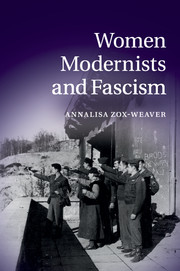Conclusion
from monster to muse
Published online by Cambridge University Press: 25 October 2011
Summary
“Do I look like the Führer? Do I really look like the Führer?”
– Adolf HitlerIn bringing the works of Riefenstahl, Stein, Flanner, and Miller into conjunction, I have sought to demonstrate how a shared fascination for the dictator was rendered individual by artistic methods and motives and by the interpretive possibilities of their respective media. I have also sought to alter the way we figure modernist women in relation to their political moment by expanding our understanding of engagement and allowing their sometimes objectionable ethical ambiguity to remain in full view. Riefenstahl is the most controversial of the women I study, producing Hitler at his most demonstrative and persuasive. Her iconic Hitler is arguably Nazism’s representative image. Riefenstahl’s body of work, most compromisingly, Triumph of the Will, is enunciative, illocutionary – an extended and implicit pointing to her own mastery over cinematic technology. In the party rally documentary, formal expertise and elaborate spectacle cloak the brutal reality of dominance. In the film’s metastructures, we see the strong hand of the director; in Hitler’s commanding image, we see Europe’s political fate. Riefenstahl laboriously crafted her public persona through films, memoirs, interviews – in the face of notorious legal battles with those who would hold her accountable.
Provocative in their own way, Stein, Flanner, and Miller figured subjective interpretation as a source of knowledge; with poetry, prose, and photographs, they generated unusual ways of declaring authority, of interpreting terror and atrocity, of imagining or understanding the intimate aspect of the perpetrator. Expanding the contours of genre and media, they reflect the chaos-effect of their subject matter. The three American artists approach Hitler through acts of critical intervention and ironic dislocation, reframing him on their own terms through the written word or through photographs of images; in their work, Riefenstahl’s Hitler is a specter, unmoored from cinematic grounding, wandering out to haunt modernist artistic representation.
- Type
- Chapter
- Information
- Women Modernists and Fascism , pp. 192 - 194Publisher: Cambridge University PressPrint publication year: 2011



